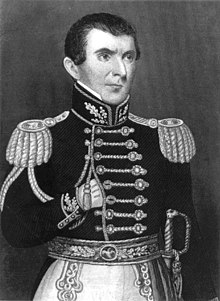Attempted assassination of Lilburn Boggs
He surmised that the suspect had fired upon Boggs and lost his firearm in the dark rainy night when the weapon recoiled due to its unusually large shot.
[1] On May 21, the Quincy Whig reported that "There are several rumors in circulation ... one of which throws the crime upon the Mormons—from the fact, we suppose, that Mr. Boggs was governor at the time, and no small degree instrumental in driving them from the State.
"[2] Some Mormons saw the assassination attempt positively: An anonymous contributor to The Wasp, a pro-Mormon newspaper in Nauvoo, Illinois, wrote on May 28 that "Boggs is undoubtedly killed according to report; but who did the noble deed remains to be found out.
Firstly, he claimed that Joseph Smith personally threatened him and forced him to make a false statement under oath.
On July 20, Boggs issued a sworn statement saying that he "believes, and has good reason to believe from evidence and information now in his possession, that Joseph Smith, commonly called the Mormon Prophet, was accessory before the fact of the intended murder;"[6] Current Missouri Governor Reynolds requested "the surrender and delivery of the said Joseph Smith" to Edward R. Ford.
Illinois governor Thomas Carlin issued arrest warrants for Joseph Smith and Porter Rockwell.
On August 8, Smith and Rockwell were placed under arrest by Thomas King, the deputy sheriff of Adams County, and two other officers.
[7] On August 10, Sheriff Thomas King returned to Nauvoo and found both men had been released by the city marshal.
[10] In a hearing on January 2, 1843, Smith was defended by US District Attorney Justin Butterfield in Federal Circuit Court before Judge Nathaniel Pope.
"[17] In 1887, more than 40 years after the events, former Latter Day Saint William Law gave an interview to the Salt Lake Tribune in which he claimed Joseph Smith had admitted a role in the assassination; Law reported that Smith stated, "I sent Rockwell to kill Boggs, but he missed him, it was a failure; he wounded him instead of sending him to Hell.


